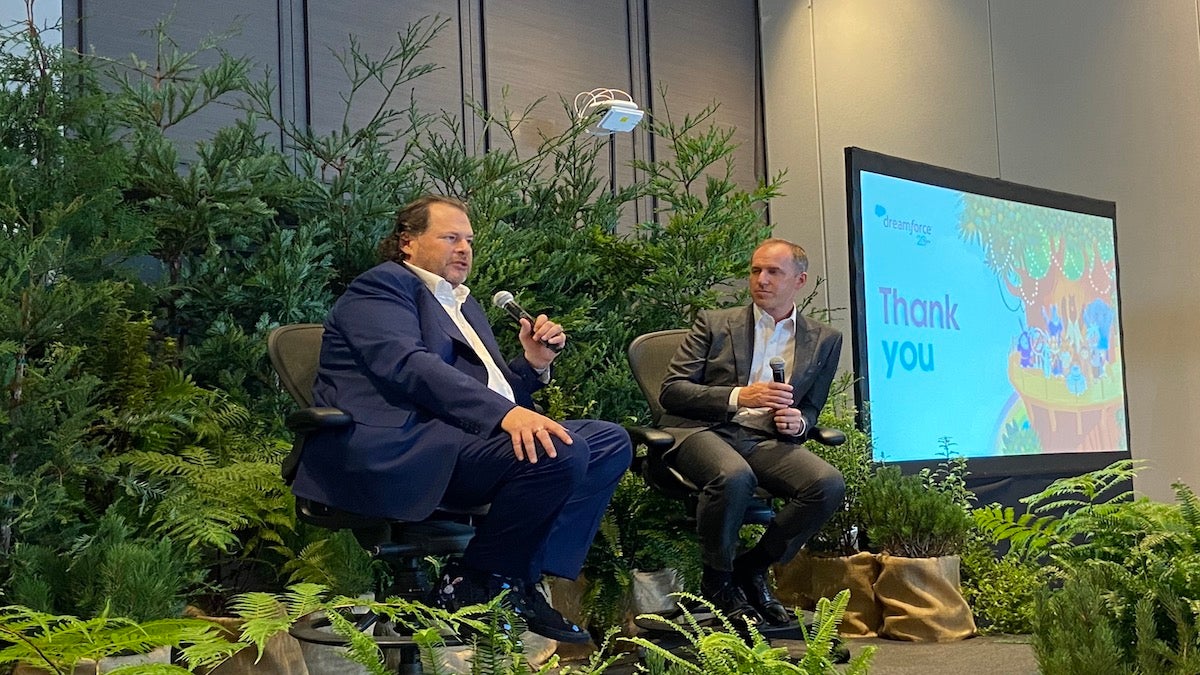
This year’s Dreamforce claims to be the most sustainable yet. At Salesforce’s annual flagship conference in San Francisco, pork and beef are off the lunchtime menu, the estimated 40,000 attendees have been issued with recyclable badges and lanyards, and international visitors can offset their travel-related carbon emissions.
Earlier this year, the cloud services company elevated sustainability to one of its core company values, alongside trust, customer success, innovation and equality. Co-CEO and chair Marc Benioff says he wants the business to “be an example to others”.
“We want to show what’s possible, but also demonstrate the practical things that we can all do to create a net-zero world, which is our ultimate goal,” he tells attendees.
One of the barriers to reaching this ambition is the current divisive nature of political discussion. Speaking after his keynote speech alongside fellow co-CEO Bret Taylor, Benioff mentioned that he had to carefully consider how he communicated the sustainability challenge, “while not creating a situation that makes people feel that it’s political or is somehow outside of what we can all do”.
This was unusual for the outspoken business leader, who has previously weighed in on political issues ranging from gun laws and abortion bans to the need to increase tax on the wealthiest – all of which remain contentious issues in the US.
However, the tech billionaire – who has made donations to both Democrats and Republicans in the past – has sought to be more guarded in sharing his political leanings since acquiring Time magazine in 2018. Benioff was also criticised at Salesforce’s annual meeting of stockholders on 9 June, for “using the company as his own political advocacy tool,” by one stockholder.
“I think it [the political climate] is too charged today, especially here in the US,” Benioff says. “We need to find a way to create a middle path, to integrate everybody into this [sustainability] discussion without them feeling that they’re taking sides on what could, potentially, feel like a partisan issue.”
Becoming an ecopreneur
One company founder who has always worn his environmentalism on his sleeve is Yvon Chouinard. Last week, the Patagonia founder gave his company away to a charitable trust dedicated to combating climate change and the fashion brand now lists the Earth as “its only shareholder”.
Benioff describes Chouinard’s actions as “amazing”, adding that he provides “a model for everybody” to follow. However, the Salesforce co-founder envisions a different strategy for his company to follow in its efforts to tackle the climate crisis.
“He [Chouinard] obviously did that in a moment in his life when he was ready to,” he says. “At Salesforce we have another opportunity, besides creating a foundation or creating wealth, which is to actually help our customers understand the issue.”
Salesforce already pledges 1% of its equity, time and product to charitable organisations and has claimed to be net zero across all emissions scopes since 2021. It also provides technology solutions to help businesses reach net zero. Its Net Zero Cloud helps businesses measure and track their greenhouse gas emissions, while the newly announced Net Zero Marketplace provides a platform for the purchasing of carbon credits.
Benioff believes these are two areas where businesses are struggling to understand their impacts. He says: “When I go around the world to talk to people about sustainability, they don’t understand carbon maths, what the numbers are and in which areas they can take action to make a difference.”
Pursuing ‘tree diplomacy’
Outside Salesforce, Benioff’s other company Time launched CO2.com yesterday (20 September), which he describes as “the easy button for reaching net zero for small and medium-size companies”. The new company division, led by Time president of sustainability Simon Mulchay, will act as a guide for businesses seeking to reduce their carbon footprint without relying on carbon offsets. Offsets are often criticised for merely shifting the problem, rather than preventing it at source.
Through his work with the World Economic Forum, Benioff and his wife Lynne have helped to fund the environmental organisations Friends of Ocean Action and 1t.org, an initiative that aims to conserve, restore and plant 1 trillion trees by 2030. It is estimated that such an effort could sequester 200 gigatons of carbon (for perspective 1 gigaton is equal to 1 billion metric tons).
Such ventures have led Benioff to describe himself as an ‘ecopreneur’ and he believes that trees in particular could play a key role in addressing the growing partisanship in relation to combating the climate crisis. “Trees are something that people can really come together around — we can have tree diplomacy,” he says.
Continuing along the bipartisan political lines, Benioff went on to express his gratitude to former US president Donald Trump for signing the country up to the trillion trees initiative in 2020, as well as current president Joe Biden for his actions on climate change undertaken through the federal budget and the Inflation Reduction Act.
Ultimately, Benioff believes that “if we don’t all come together on the climate then we’re going to have a very unfortunate situation on our hands.”

This year’s Dreamforce claims to be the most sustainable yet. At Salesforce's annual flagship conference in San Francisco, pork and beef are off the lunchtime menu, the estimated 40,000 attendees have been issued with recyclable badges and lanyards, and international visitors can offset their travel-related carbon emissions.
Earlier this year, the cloud services company elevated sustainability to one of its core company values, alongside trust, customer success, innovation and equality. Co-CEO and chair Marc Benioff says he wants the business to “be an example to others”.
“We want to show what's possible, but also demonstrate the practical things that we can all do to create a net-zero world, which is our ultimate goal,” he tells attendees.
